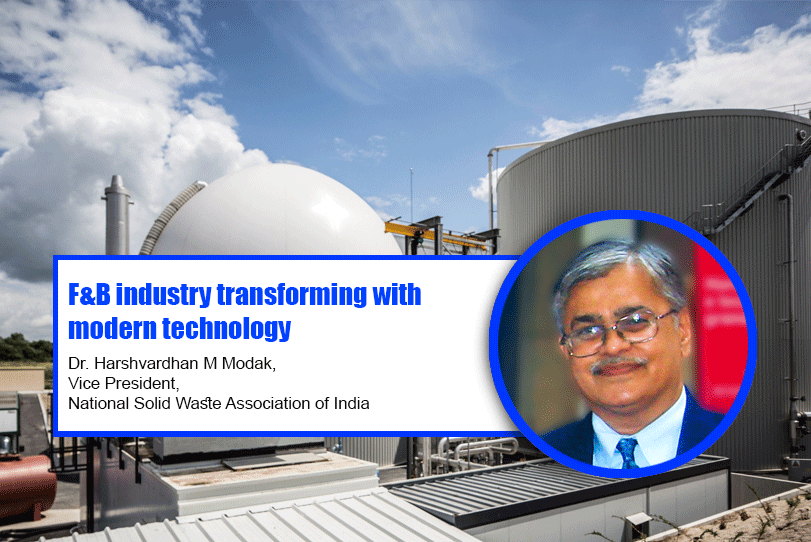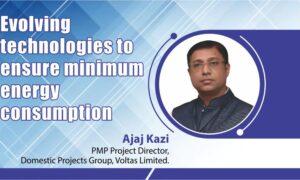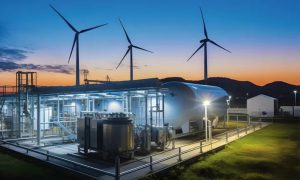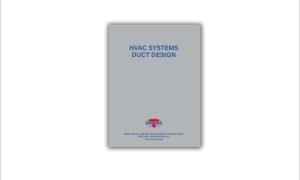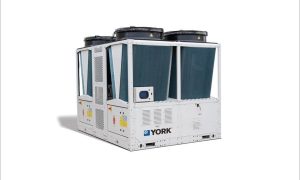Dr. Harshvardhan M Modak, Vice President, National Solid Waste Association of India, discusses about F&B sector’s upcoming improvements and the current management skills.
What according to you is the current scenario of waste management in F&B industry?
Although the question is a generic one, I shall like to speak about the scenario of waste management of Food and Beverage Industry in India. It constitutes two major sub-sectors, viz. Industry and Consumers. And the industry consists of food processing industry, dairy, industry manufacturing snacks, cold storages, beverages manufacturing industry etc. Consumer sector consists of hotels, restaurants, eateries, marriage halls, public events etc. The houses, residences, colonies, condominiums and residences etc; also form part of consumer sub-sector.
Waste from Industrial sub-sector is usually well managed, being covered under Pollution Control Boards and hence monitored periodically. In fact, many units in this sector are producing biogas and manure from their waste and using the biogas for energy generation. Lacunae exist, if any, are in terms of housekeeping, efficiency of operations, productivity of biogas or quality of manure. However, in spite of all these lacunae, it can be said that the waste is managed acceptably well.
Waste from consumer sector in F and B, contributes to the biodegradable portion of the total municipal solid waste (MSW) in any Urban Local Body (ULB). On a national average biodegradable portion ranges from 40 to 50 percent of the total MSW in India. This also includes collection from household/door to door waste collection, however on an average, again 60 percent of the bio-degradation portion comes from large entities in this sub-sector.
Since the segregation is not very effective, the proper processing of and disposal of biodegradable waste from this sub-sector, leaves much to be desired. It hence is the main eyesore in the overall waste management, producing stink and becomes a hotbed of diseases.
What have been the major impending and alarming concern in terms of managing wastes in food processing units?
The food processing units, as such, are classified as factories and hence are subject to taking proper consent to operate from Pollution Control Boards in the relevant states. They also are required to submit periodic progress reports etc. Hence the situation of the waste there from is not entirely bad, barring some unscrupulous units, especially in small scale sector. Small scale sector operate on smaller margins and hence tend to cut corners by avoiding waste management. As informed earlier, the lacunae in waste management in food processing industries are in terms of house keeping, efficiency of the process, quality of manure or especially the residue after biogas. There is always a scope for improvement.
What are the plausible ways of managing organic waste at the F&B industry?
Waste in food processing industry has long been dealt with by traditional methods of anaerobic bio-digestion followed by aerobic activated sludge process. These processes do not happen automatically and need careful monitoring and supervision by experienced operators. If not done properly, the microbiological process may get totally disturbed. It is a long term process to bring them back to normal by changing the septic cultures. Else biogas does not get properly produced and significant BOD is left behind. This further disturbs the aerobic process for the effluent leftover after anaerobic digestion.
If it is to be done in proper way, continuous monitoring of efficiency of anaerobic digestion and of aerobic process in activated sludge section. This will assure sustainable results in terms of BOD removal and recycle of the water in effluent.
What kind of the crucial economic and geographic factors taken into consideration in managing F&B industrial waste?
Economic factors: For expecting anything proper in any industry, it should be economic based. If there is any economic outcome in any operation, then management ensures that operations runs well. Same principle applies to waste management. Fortunately, biogas as a fuel, is a viable economic outcome possible from waste management in F and B industry. It helps reduce the fuel consumption in the energy department of the same.
In case the ETP operations enable recycle of water and if it reduces the water consumption, then management also closely monitors it and hence the proper operational results follow. Water is a precious commodity and lack of the same in adequate quantity may throttle the productivity. Hence water is crucial factor.
Apart from the two main factors, if waste management offers any gainful commodity (like manure etc. in some cases), then the same is also encouraged.
Geographic Factors: The geographic situation in some cases does not support proper implementation of ETP units and production of biogas is reduced; BOD removal in ETP is affected. This happens especially winter season, where temperatures drop to a level, which does not support microbiological reaction.
Water scarce geography takes toll of the number of operating days in a unit. So special efforts in making water available or recycling the same to maximum extent becomes imperative.
How far do you think the industries are adhering to the guidelines of managing and recycling the food processing waste?
The past record of the industries in the food-processing sector to process their waste properly was indeed dismal.However with the advent of enlightenment of public in general, their awareness of the environmental and pollution control acts the things are different. The advent of special tribunals like National Green Tribunal (NGT) it has become very easy to approach courts for legal remedies for environmental wrong doings. Many big corporations and even government itself are scared of environmental non-compliance in their workings. The judiciary is nowadays very active in quickly addressing the environmental non-compliance.
As a result of this , the managements of food processing units have woken up to these new challenges and overall are improving their waste processing departments towards compliance.
What according to you is most critical of using technology to meet rural challenges? [What according to you are the challenges while using technology in rural areas (in terms of transport, logistics, food safety?]
The majority of food processing industry, especially which depends on agro-produce or dairy, usually is geographically located in rural areas. E.g. Sugar industry, Dairy industry, starch industry, soya bean industry to name a few, are all located in rural areas. All of them use modern technology for production. Looking at their experience over number of years, it is clear that rural area does not pose any problem in their existence there and day to day operations.
In fact due to government’s policy of dispersal of industries all over rural are (to avoid concentration in urban areas) has paid rich dividends. As a result there are all types of industries in rural areas.
The fear of using modern technology in rural area does not exist at all. The manpower can be trained for operations, maintenance, replacement etc. The schools, colleges, ITI facility exist in these areas, where people can be trained.
The only challenge remains is of proper road connectivity. Railway network is fairly good. However last mile connectivity still depends on road based logistics. The unscrupulous elements in local bodies prevent proper express and fast road network right up to rural area. During rainy season, many times the transport of raw and finished goods is affected. Perishable goods get severely affected many times due to lack of this last mile connectivity.
What critical steps would you suggest to manage food waste that occurs during the transport from rural areas?
The challenge mentioned above of lack of last mile connectivity, may lead to spillage of the goods on the road. The biodegradability leads to the residue becoming rancid and smells bad. Better roads and enclosed container based transport may solve the problem, but economics too has to be worked out.
Delays in transport also may spoil the perishable goods. But lately units have taken adequate precaution in terms of refrigerated transportation to avoid spoilages.
The majority of food processing industry, especially which depends on agro-produced dairy and other products. Better roads and enclosed container based transport may solve the problem, but economics too has to be worked out.
Dr. Harshvardhan M Modak, Vice President, National Solid Waste Association of India
Cookie Consent
We use cookies to personalize your experience. By continuing to visit this website you agree to our Terms & Conditions, Privacy Policy and Cookie Policy.

